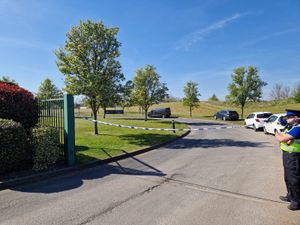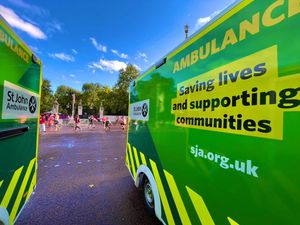Walsall hospital trust must make 'significant improvements' to medical services within three months
A Black Country hospital trust has been told it must make 'significant improvements' to its medical services within three months following an inspection by the Care Quality Commission.

A focused inspection was carried out at Walsall Manor Hospital due to concerns raised about the safety and quality of services, specifically within the medical wards at the hospital.
After the inspection, the Walsall Healthcare NHS Trust was issued with a warning notice due to concerns found around staffing and governance – as well as how patients were discharged. The notice has given the trust three months to rectify areas of concern identified.
The improvements needed to be made include putting systems in place to ensure staff are suitably qualified, skilled and competent to care for and meet the needs of patients within all areas of the medical services; effective risk and governance systems must be embedded that support safe, quality care; and systems must also be put in place to ensure staffing is actively assessed, reviewed and escalated appropriately to prevent exposing patients to the risk of harm.
The trust must also ensure all staff are competent in the use of the recommended summary plan for emergency care and treatment (ReSPECT) forms.
As a result of the inspection, the overall rating of medical services at Walsall Manor Hospital changed from requires improvement to inadequate.
Medical services were rated inadequate for being safe, responsive and well-led.
The overall trust rating remains unchanged as requires improvement.
Abuse
A report, published following the inspection on March 9, said: "We were not assured all staff understood how to protect patients from abuse and the service did not always work well with other agencies to do so. Staff had training on how to recognise and report abuse however not all staff knew how to apply it.
"Staff did not always know how to identify adults and children at risk of, or suffering, significant harm and therefore did not always alert other agencies to risks. Despite having training around safeguarding children and vulnerable adults, staff were not always able to put the theory into practice.
"The service did not always control infection risk well. Staff did not always implement control measures to protect patients, themselves and others from infection. However, at the time of our inspection equipment and the premises were visibly clean.
"Staff completed and updated risk assessments for each patient and removed or minimised risks. Staff identified and acted upon patients at risk of deterioration.
"Whilst the service had systems in place take account of patients’ individual needs and preferences, robust arrangements were not always in place to provide assurance of safe and effective patient discharge. Most staff were able to implement reasonable adjustments to help patients access services.
"We were not assured all leaders had the skills and abilities to run the service. They did not always understand and manage the priorities and issues the service faced. However, most of the leaders supported staff to develop their skills and take on more senior roles."
Under-staffing
Fiona Allinson, CQC’s deputy chief inspector of hospitals, said: “When inspectors visited medical services at Walsall Healthcare NHS Trust, it was clear that staff supported one another to deliver patient focused care but it was evident that under-staffing was causing a deterioration in the quality of that care.
“All wards we visited identified low staffing as the main risk. On one ward, concerns were raised over the development of a bay for people requiring additional oxygen support which required increased staffing to maintain safe standards. It was concerning that staffing for this ward was low prior to this specialist bay opening.
“In addition, the inconsistent way governance issues were communicated with staff had impacted on the information they received around learning from incidents and complaints. Staff were unable to tell us about any recent learning that had been cascaded down to them.
“Inspectors reported their findings to the trust leadership and asked them to send us a report outlining what action they will take to meet these requirements. We will continue to monitor the service to ensure the necessary improvements are made.”
Professor David Loughton CBE, interim chief executive at Walsall Healthcare NHS Trust, has now pledged to increase support to staff in light of the findings of the report and praised their dedication, working tirelessly throughout the pandemic.
Action plan
An action plan has now been put in place to improve the trust's medical services and will focus on the key CQC findings – including that the trust didn’t always have enough staff to care for patients and keep them safe; that some patients didn’t receive individualised plans of care for their end of life care; that there was an inconsistent approach to how leaders ran services which meant staff did not always feel respected, supported and valued; and that leaders did not operate an effective governance process to continually improve the quality of the service and safeguard the standards of care.
Professor Loughton said: “While today’s report clearly shows us we need to make improvements I am pleased that the CQC inspectors recognised the “kind and compassionate, respectful and dignified care” shown by our staff towards patients.
“We are developing an action plan to address the recommended areas of improvement identified in the report that will be driven by our staff. We will listen to them and work with them to deliver the improvements that they, our patients and our families deserve.”
He said the report also highlighted that staff managed medicine administration well and assessed risks to patients, acted on them and kept good care words; and that staff remained focused on the needs of patients receiving care and their efforts to meet patients’ individual needs, especially where English was not their first language was recognised.
Professor Loughton added: “Staff have had to contend with so much this last 12 months. While the number of patients with the virus has substantially decreased they have been trying to focus on restoring the pre-Covid services we provide to our patients.
"Today’s report is disappointing and I know it will hit staff really hard but I want them to know that the responsibility for getting this right isn’t on their shoulders – it’s something Walsall Healthcare as an organisation absolutely must take responsibility for, tackle and resolve.
“When I was appointed interim chief executive I made it clear that one of our priorities has to be eliminating reliance on agency staff and increasing our recruitment, which will be helped by the lifting of overseas travel restrictions.
“This is echoed throughout the report where the inspectors detail examples of staff shortages and the additional pressure and worry it has placed on our workforce. This also affects other areas of concern raised.
“We know that if our staff morale is low and the culture of an organisation is such that they are afraid to raise concerns and don’t feel valued that the impact will inevitably be felt by patients. Our colleagues are in a caring profession because they want to make a difference to people’s lives and we need to ensure they are adequately supported to do so.”



